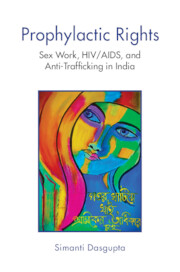Book contents
- Frontmatter
- Dedication
- Contents
- List of Figures
- Acknowledgements
- Introduction: The Karmi (Worker)—From Pesha (Prostitution) to Kaaj (Sex Work)
- 1 The Laboring Gatar: The Body between Suffering and Risk
- 2 Condom-wallis (Condom Sellers) and Condom Narratives
- 3 The Politics of Victimhood: Pachar and Trafficking
- 4 Mela, Immobility, and Imperial Feminism
- Epilogue: Another Virus, Another Lockdown
- Bibliography
- Index
1 - The Laboring Gatar: The Body between Suffering and Risk
Published online by Cambridge University Press: 31 May 2024
- Frontmatter
- Dedication
- Contents
- List of Figures
- Acknowledgements
- Introduction: The Karmi (Worker)—From Pesha (Prostitution) to Kaaj (Sex Work)
- 1 The Laboring Gatar: The Body between Suffering and Risk
- 2 Condom-wallis (Condom Sellers) and Condom Narratives
- 3 The Politics of Victimhood: Pachar and Trafficking
- 4 Mela, Immobility, and Imperial Feminism
- Epilogue: Another Virus, Another Lockdown
- Bibliography
- Index
Summary
“You don't get it, do you?” Bimala-di suddenly quipped at me towards the end of her story. “The h(n)ari [cooking pot] was the only thing we had.” She was recounting her life before she came to Sonagachi about 20 years ago. Her parents could not feed the family, so every afternoon around lunch time, Bimala-di and her sister would go to the neighbors’ houses to collect the starch – usually drained and disposed off after the rice was cooked – in an aluminum pot and bring it home to share with the family. The timing was important, she emphasized. If they arrived early, it may have annoyed the neighbors, while if they arrived late, the starch would have already been discarded. Some neighbors were sympathetic and sometimes saved the starch if they remembered, but that was never assured. Moreover, Bimala-di was correct when she inferred that I had indeed overlooked the significance of the pot. As the only material possession, it symbolized her family's experience of poverty and hunger. “Yes, that is the only, the only thing we had, just a pot.” She followed up with another question: “Have you ever been hungry for days? And that you don't even know when is the next time you may secure some food?” She noticed my predictable silence and added, “Khider jala, boro jala” (The burn of hunger is especially painful). She continued:
People think we, sex workers, have a tail hanging down our ass, as though we are an ajab bastu [strange things]. But we are just like anybody else, workers trying to earn money to live. I am with Durbar, my body is now fighting HIV, but also for rights, not just food.
Finally, she proudly repeated the widely recognized slogan of Durbar to sum up her argument:
Gatar khatiye kahi, shramiker adhikaar chai (We use our bodies to earn our livelihood, we demand labor rights).
Bimala-di conjures the image of a deprived life in the village, widely shared by other women in Sonagachi, which led them to migrate to the city in search of livelihood. Even in the city, she observes that sex workers are seen as ajab bastu, or strange things.
- Type
- Chapter
- Information
- Prophylactic RightsSex Work, HIV/AIDS, and Anti-Trafficking in India, pp. 62 - 109Publisher: Cambridge University PressPrint publication year: 2024

